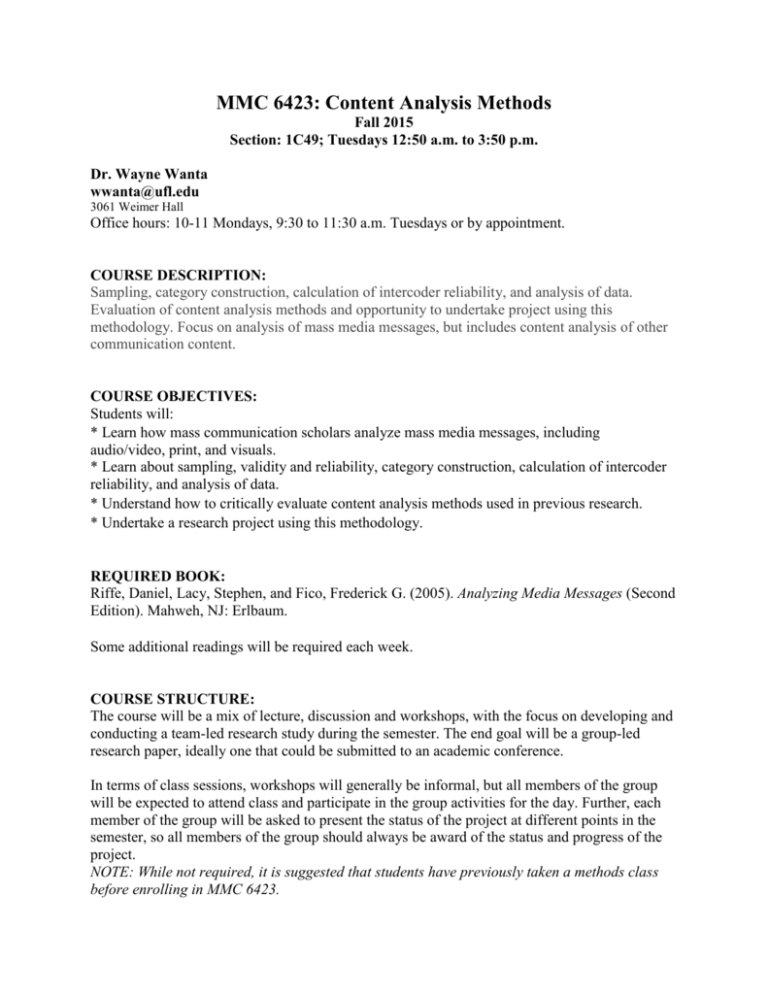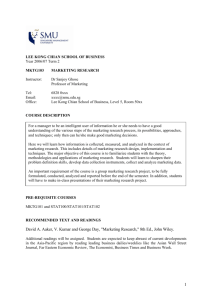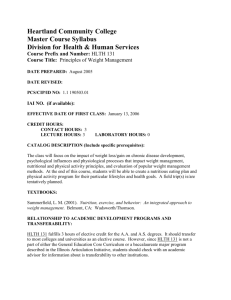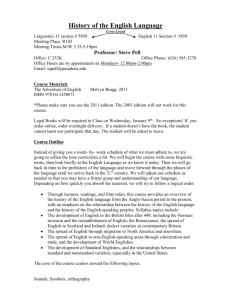MMC 6423: Content Analysis Methods
advertisement

MMC 6423: Content Analysis Methods Fall 2015 Section: 1C49; Tuesdays 12:50 a.m. to 3:50 p.m. Dr. Wayne Wanta wwanta@ufl.edu 3061 Weimer Hall Office hours: 10-11 Mondays, 9:30 to 11:30 a.m. Tuesdays or by appointment. COURSE DESCRIPTION: Sampling, category construction, calculation of intercoder reliability, and analysis of data. Evaluation of content analysis methods and opportunity to undertake project using this methodology. Focus on analysis of mass media messages, but includes content analysis of other communication content. COURSE OBJECTIVES: Students will: * Learn how mass communication scholars analyze mass media messages, including audio/video, print, and visuals. * Learn about sampling, validity and reliability, category construction, calculation of intercoder reliability, and analysis of data. * Understand how to critically evaluate content analysis methods used in previous research. * Undertake a research project using this methodology. REQUIRED BOOK: Riffe, Daniel, Lacy, Stephen, and Fico, Frederick G. (2005). Analyzing Media Messages (Second Edition). Mahweh, NJ: Erlbaum. Some additional readings will be required each week. COURSE STRUCTURE: The course will be a mix of lecture, discussion and workshops, with the focus on developing and conducting a team-led research study during the semester. The end goal will be a group-led research paper, ideally one that could be submitted to an academic conference. In terms of class sessions, workshops will generally be informal, but all members of the group will be expected to attend class and participate in the group activities for the day. Further, each member of the group will be asked to present the status of the project at different points in the semester, so all members of the group should always be award of the status and progress of the project. NOTE: While not required, it is suggested that students have previously taken a methods class before enrolling in MMC 6423. GRADING: Grading for the course will consist of the following components: Class assignments (5) 25 percent Class presentations (2) 15 percent Class Participation/Attendance 10 percent Final Group Research paper 50 percent FINAL PAPER: Each student or group will turn in a final paper that, with some revision and polishing, would be of the quality acceptable for presentation at national conference proceedings (e.g., ICA or AEJMC). These papers are generally 20-25 pages of text. The product must be a complete research project, not just a literature review or research design. The papers will be written in sections: INTRODUCTION (Due Sept. 15): Students will work individually or in groups on a research project. Students will develop a content analysis study design that will be conducted during the semester. The assignment will outline the study parameters and appropriate samples, include hypotheses and/or research questions and provide a clear calendar of how/when study will be conducted within the confines of the class. A theoretical framework should be suggested, although perhaps only briefly. Suggestion is 5-8 pages. CODEBOOK, LITERATURE REVIEW (Due Sept. 29): Each group/individual will design a detailed code book/coding guide outlining each variable and how it will be measured. This will accompany a literature review citing previous research related to the study. INTERCODER RELIABILITY, METHOD (Due Oct. 20): After data collection, the group/individual will turn in a basic methods section, demonstrating how each of its Hs and RQs are tested. This will include a textual explanation of the analysis. This needs to include calculation of intercoder reliability for all main variables. A good site for this material is http://dfreelon.org/utils/recalfront/ FINAL COMPLETED PAPER (Due Dec. 8) CLASS ASSIGNMENTS: Each student will find and discuss articles relating to their final paper and discuss how the authors: explained the purpose (Introduction), developed the theoretical framework (Literature Review) measured the main concept (Methods section), presented the findings (Results section) and discussed the results (Discussion section). Each assignment should be one to two pages long and should be sent via email by noon on Tuesdays. CLASS PRESENTATIONS: Each student will present two of the class assignments in class. The presentations should concentrate on the section of the articles under discussion for that week. The presentations should take 10 to 15 minutes. Students should turn in a three-page paper explaining their main points. CLASS PARTICIPATION/ATTENDANCE: Students are expected to attend every class and to participate in class discussions. Excuses for absences must be legitimate. DO NOT tell me that you have to go to Wrestlemania (unless you have an extra ticket for me). More than one absence will affect your final grade. Students will receive a failing grade for missing 3 or more classes. FINAL GRADING: The university’s grading information can be found at http://www.registrar.ufl.edu/catalog/policies/regulationgrades.html. Final grades will be tallied using the following scale for the class: 92-100 A 90-91.99 A88-89.99 B+ 82-87.99 B 80-81.99 B78-79.99 C+ 72-77.99 C 70-71.99 C68-69.99 D+ 62-67.99 D 60-61.99 DBelow 60 E MISCELLANEOUS Assignments and Readings: All assignments must be turned in at the BEGINNING of class or earlier. No exceptions. All readings are to be completed before the start of lecture on the day assigned. Given the fluid nature of the research project, deadlines for assignments may be delayed depending upon circumstances. If a situation arises (personal or course-related) in which a student/group may need extra time for an assignment, the instructor must be informed IN ADVANCE and will determine the appropriate remedy. Extensions are they guaranteed. Requirements for class attendance and make-up exams, assignments, and other work are consistent with university policies that can be found at: https://catalog.ufl.edu/ugrad/current/regulations/info/attendance.aspx Class Attendance/Participation: Students who miss class for excused absences (as defined by university policies at http://www.registrar.ufl.edu/catalog/policies/regulationattendance.html) must make arrangements with the professor IN ADVANCE of the absence. In addition to attendance, students must participate in discussions and add to the intellectual content of the course. Both of these criteria must be met to receive the full points of credit in this portion of the class. Plagiarism; Cheating or other Academic Misconduct: The Academic Integrity Statement for the College of Journalism and Communications can be found here: http://www.jou.ufl.edu/grad/forms/Plagiarism-Guideline.pdf In addition, all students are bound by the university’s Honor Code Policy at http://www.dso.ufl.edu/judicial/honorcode.php. Anyone who violates these policies in this course will receive a failing grade in this course and face further sanctions from the college and university. Special needs: Students requesting classroom accommodation must first register with the Dean of Students Office. The Dean of Students will provide documentation to the student who must then provide this documentation to the instructor when requesting accommodation. This course conforms to all requirements of the ADA and handles with sensitivity all matters related to gender, race, sexual orientation, age, religion or disability. Please alert the instructor if any issues arise. Syllabus Changes: The instructor reserves the right to alter the syllabus or course schedule as the need arises. This includes the possibility of guest speakers and special presentations, some of which may be scheduled outside of classtime. Note: Some of the content for this syllabus was taken from syllabi from previous classes. Syllabus Disclaimer: Much of the content of this syllabus was borrowed from previous syllabi for the course. Tips for getting good grades: Come to class on time. Turn off your cellphone (or leave it at home). Complete all of the readings before class. Laugh at my jokes. Tentative schedule August 25, Week 1: Getting started: Content Analysis as a Research Tool Introduction September 1, Week 2: Developing Research Designs Picking topics, study designs, forming groups Readings: Riffe et al, Ch. 1, 2 & 3; Lee, Ryan, Wanta & Chang, Looking Presidential September 8, Week 3: Sampling Choosing sample to fit study, types of samples Readings: Riffe et al., Ch. 5. Assignment I: Find a journal article that you feel effectively explains the purpose of a study similar to your final study. Be prepared to discuss the study in class. September 15, Week 4: Measurement Group Research Design, Introductions Due Types of variables , coding, developing clear definitions Readings: Riffe et al., Ch. 4. September 22, Week 5: Developing Codebooks and Coding Guides More on measurement Assignment II: Find a journal article that you feel effectively develops a theoretical framework similar to your final study. Be prepared to discuss the study in class. September 29, Week 6: Intercoder Reliability and Validity Calculating intercoder reliability Codebooks, Literature reviews due Readings: Riffe et al., Ch.6 & 7. October 6, Week 7: Reliability and Validity Readings: Riffe, Ch. 9. Assignment III: Find a journal article that you feel effectively employs a method similar to your final study. Be prepared to discuss the study in class. October 13, Week 8: Catch our breath … October 20, Week 9: Data Analysis Intercoder reliability, Methods sections due Basics of SPSS for analysis Readings: Riffe et al. Ch. 8 October 27, Week 10: Data Collection Assignment IV: Find a journal article that you feel effectively explains the results of a content analysis study. Be prepared to discuss the study in class. November 3, Week 11: Writing results and conclusions Writing results, linking back to theory Readings: Bem, D. J. (2003). Writing the empirical journal article. In J.M. Darley, M. P. Zanna, & H. L. Roediger III (Eds), The Compleat Academic. Washington, DC: American Psychological Association. Found at http://dbem.ws/WritingArticle.pdf Assignment V: Find a journal article that you feel has an effective discussion section. Be prepared to discuss the study in class. November 10, Week 12: Group meetings November 17, Week 13: Group meetings November 24, Week 14: Thanksgiving: No class December 1, Week 15: Class Presentations In-class group presentations December 8, Week 16: Class Presentations In-class group presentations Final papers due by noon December 8







